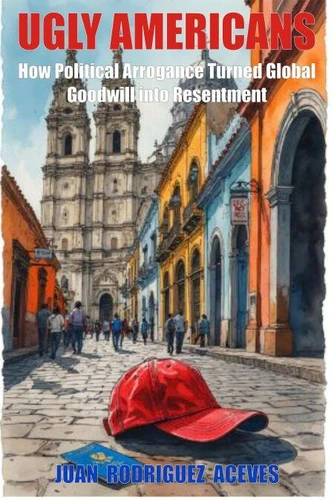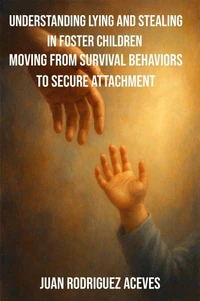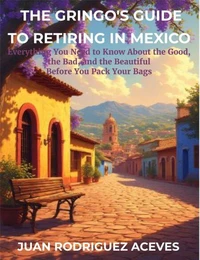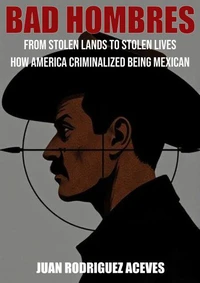Nouveauté
Ugly Americans: How Political Arrogance Turned Global Goodwill into Resentment
Par :Formats :
Disponible dans votre compte client Decitre ou Furet du Nord dès validation de votre commande. Le format ePub est :
- Compatible avec une lecture sur My Vivlio (smartphone, tablette, ordinateur)
- Compatible avec une lecture sur liseuses Vivlio
- Pour les liseuses autres que Vivlio, vous devez utiliser le logiciel Adobe Digital Edition. Non compatible avec la lecture sur les liseuses Kindle, Remarkable et Sony
 , qui est-ce ?
, qui est-ce ?Notre partenaire de plateforme de lecture numérique où vous retrouverez l'ensemble de vos ebooks gratuitement
Pour en savoir plus sur nos ebooks, consultez notre aide en ligne ici
- FormatePub
- ISBN8232606169
- EAN9798232606169
- Date de parution09/10/2025
- Protection num.pas de protection
- Infos supplémentairesepub
- ÉditeurDraft2Digital
Résumé
For decades, American tourists enjoyed an unspoken privilege when traveling abroad: automatic welcome, eager hospitality, and the benefit of the doubt. That era is over. In Mexico and around the world, the reception has changed, and Americans are paying prices they didn't expect for damage they didn't personally cause. Juan Rodriguez Aceves writes from the ground level of this transformation, documenting what happens when political arrogance destroys diplomatic goodwill and ordinary people on both sides deal with the consequences.
From his vantage point in Guadalajara, Mexico, he's watched neighborhoods transform, relationships cool, and the easy cross-cultural exchange that once felt natural become fraught with suspicion and calculation. This isn't a book about policy analysis or political theory. It's about the café owner whose warmth toward American guests disappeared after years of insults from their president. It's about the immigration officer whose hands shake with suppressed anger as they process passports.
It's about Americans wearing MAGA hats in Mexican plazas, seemingly oblivious that they're displaying symbols of contempt while expecting to be served with smiles. It's about longtime residents displaced from neighborhoods their families inhabited for generations, as remote workers with American salaries drive up costs beyond local reach. Juan explores the practical consequences Americans now face: visa requirements where none existed before, hotels quietly charging premium rates for American bookings, tour guides withdrawing the generous cultural sharing they once offered freely.
He examines the gentrification crisis accelerated by digital nomads, who bring American purchasing power to Mexican housing markets, transforming communities into commodities. Through personal stories and honest observation, Juan documents both sides of this painful transformation. The Americans who never voted for the policies that damaged relationships but carry their weight anyway. The Mexicans who need tourism economically but struggle to maintain dignity while serving people whose government has insulted them.
This is not an anti-American screed. Juan knows Americans who are genuinely trying to travel respectfully, who are learning Spanish seriously, who are horrified by what their government did. But he also understands why Mexicans can't always make distinctions between individual Americans and collective impact, why self-protection became necessary, why automatic hospitality had to be withdrawn. For American readers, this book offers uncomfortable truths about how they're perceived abroad and why.
It provides a roadmap for traveling responsibly in this new environment, for earning welcome rather than expecting it, for understanding impact beyond intention. For non-American readers, it offers validation of experiences they've had but rarely see documented. It names the resentment about being expected to separate government from citizens while still needing tourism dollars. And for everyone, it explores whether repair is possible.
Whether the damage done can be undone. Whether trust has been broken completely can be rebuilt. Whether Americans and Mexicans can find their way back to a genuine connection or whether we're in a permanent new normal. Most importantly, it's honest. Brutally, uncomfortably, necessarily honest. About what was lost, what was damaged, who was hurt, and what it might take to move forward.
From his vantage point in Guadalajara, Mexico, he's watched neighborhoods transform, relationships cool, and the easy cross-cultural exchange that once felt natural become fraught with suspicion and calculation. This isn't a book about policy analysis or political theory. It's about the café owner whose warmth toward American guests disappeared after years of insults from their president. It's about the immigration officer whose hands shake with suppressed anger as they process passports.
It's about Americans wearing MAGA hats in Mexican plazas, seemingly oblivious that they're displaying symbols of contempt while expecting to be served with smiles. It's about longtime residents displaced from neighborhoods their families inhabited for generations, as remote workers with American salaries drive up costs beyond local reach. Juan explores the practical consequences Americans now face: visa requirements where none existed before, hotels quietly charging premium rates for American bookings, tour guides withdrawing the generous cultural sharing they once offered freely.
He examines the gentrification crisis accelerated by digital nomads, who bring American purchasing power to Mexican housing markets, transforming communities into commodities. Through personal stories and honest observation, Juan documents both sides of this painful transformation. The Americans who never voted for the policies that damaged relationships but carry their weight anyway. The Mexicans who need tourism economically but struggle to maintain dignity while serving people whose government has insulted them.
This is not an anti-American screed. Juan knows Americans who are genuinely trying to travel respectfully, who are learning Spanish seriously, who are horrified by what their government did. But he also understands why Mexicans can't always make distinctions between individual Americans and collective impact, why self-protection became necessary, why automatic hospitality had to be withdrawn. For American readers, this book offers uncomfortable truths about how they're perceived abroad and why.
It provides a roadmap for traveling responsibly in this new environment, for earning welcome rather than expecting it, for understanding impact beyond intention. For non-American readers, it offers validation of experiences they've had but rarely see documented. It names the resentment about being expected to separate government from citizens while still needing tourism dollars. And for everyone, it explores whether repair is possible.
Whether the damage done can be undone. Whether trust has been broken completely can be rebuilt. Whether Americans and Mexicans can find their way back to a genuine connection or whether we're in a permanent new normal. Most importantly, it's honest. Brutally, uncomfortably, necessarily honest. About what was lost, what was damaged, who was hurt, and what it might take to move forward.
For decades, American tourists enjoyed an unspoken privilege when traveling abroad: automatic welcome, eager hospitality, and the benefit of the doubt. That era is over. In Mexico and around the world, the reception has changed, and Americans are paying prices they didn't expect for damage they didn't personally cause. Juan Rodriguez Aceves writes from the ground level of this transformation, documenting what happens when political arrogance destroys diplomatic goodwill and ordinary people on both sides deal with the consequences.
From his vantage point in Guadalajara, Mexico, he's watched neighborhoods transform, relationships cool, and the easy cross-cultural exchange that once felt natural become fraught with suspicion and calculation. This isn't a book about policy analysis or political theory. It's about the café owner whose warmth toward American guests disappeared after years of insults from their president. It's about the immigration officer whose hands shake with suppressed anger as they process passports.
It's about Americans wearing MAGA hats in Mexican plazas, seemingly oblivious that they're displaying symbols of contempt while expecting to be served with smiles. It's about longtime residents displaced from neighborhoods their families inhabited for generations, as remote workers with American salaries drive up costs beyond local reach. Juan explores the practical consequences Americans now face: visa requirements where none existed before, hotels quietly charging premium rates for American bookings, tour guides withdrawing the generous cultural sharing they once offered freely.
He examines the gentrification crisis accelerated by digital nomads, who bring American purchasing power to Mexican housing markets, transforming communities into commodities. Through personal stories and honest observation, Juan documents both sides of this painful transformation. The Americans who never voted for the policies that damaged relationships but carry their weight anyway. The Mexicans who need tourism economically but struggle to maintain dignity while serving people whose government has insulted them.
This is not an anti-American screed. Juan knows Americans who are genuinely trying to travel respectfully, who are learning Spanish seriously, who are horrified by what their government did. But he also understands why Mexicans can't always make distinctions between individual Americans and collective impact, why self-protection became necessary, why automatic hospitality had to be withdrawn. For American readers, this book offers uncomfortable truths about how they're perceived abroad and why.
It provides a roadmap for traveling responsibly in this new environment, for earning welcome rather than expecting it, for understanding impact beyond intention. For non-American readers, it offers validation of experiences they've had but rarely see documented. It names the resentment about being expected to separate government from citizens while still needing tourism dollars. And for everyone, it explores whether repair is possible.
Whether the damage done can be undone. Whether trust has been broken completely can be rebuilt. Whether Americans and Mexicans can find their way back to a genuine connection or whether we're in a permanent new normal. Most importantly, it's honest. Brutally, uncomfortably, necessarily honest. About what was lost, what was damaged, who was hurt, and what it might take to move forward.
From his vantage point in Guadalajara, Mexico, he's watched neighborhoods transform, relationships cool, and the easy cross-cultural exchange that once felt natural become fraught with suspicion and calculation. This isn't a book about policy analysis or political theory. It's about the café owner whose warmth toward American guests disappeared after years of insults from their president. It's about the immigration officer whose hands shake with suppressed anger as they process passports.
It's about Americans wearing MAGA hats in Mexican plazas, seemingly oblivious that they're displaying symbols of contempt while expecting to be served with smiles. It's about longtime residents displaced from neighborhoods their families inhabited for generations, as remote workers with American salaries drive up costs beyond local reach. Juan explores the practical consequences Americans now face: visa requirements where none existed before, hotels quietly charging premium rates for American bookings, tour guides withdrawing the generous cultural sharing they once offered freely.
He examines the gentrification crisis accelerated by digital nomads, who bring American purchasing power to Mexican housing markets, transforming communities into commodities. Through personal stories and honest observation, Juan documents both sides of this painful transformation. The Americans who never voted for the policies that damaged relationships but carry their weight anyway. The Mexicans who need tourism economically but struggle to maintain dignity while serving people whose government has insulted them.
This is not an anti-American screed. Juan knows Americans who are genuinely trying to travel respectfully, who are learning Spanish seriously, who are horrified by what their government did. But he also understands why Mexicans can't always make distinctions between individual Americans and collective impact, why self-protection became necessary, why automatic hospitality had to be withdrawn. For American readers, this book offers uncomfortable truths about how they're perceived abroad and why.
It provides a roadmap for traveling responsibly in this new environment, for earning welcome rather than expecting it, for understanding impact beyond intention. For non-American readers, it offers validation of experiences they've had but rarely see documented. It names the resentment about being expected to separate government from citizens while still needing tourism dollars. And for everyone, it explores whether repair is possible.
Whether the damage done can be undone. Whether trust has been broken completely can be rebuilt. Whether Americans and Mexicans can find their way back to a genuine connection or whether we're in a permanent new normal. Most importantly, it's honest. Brutally, uncomfortably, necessarily honest. About what was lost, what was damaged, who was hurt, and what it might take to move forward.










